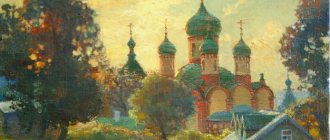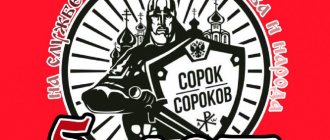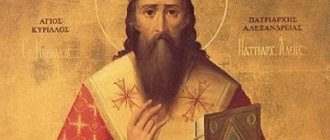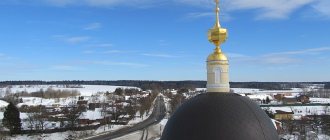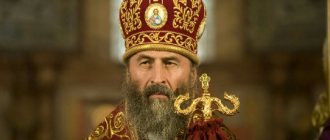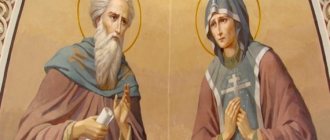Biography
The 12th-century Orthodox theologian and educator Kirill of Turov gained fame as a selfless preacher of God's word and a possessor of deep church knowledge. His biography intertwined monastic seclusion, national fame and trust, which elevated him to the rank of bishop, and serious educational work. Kirill Turovsky left behind a huge literary heritage: sermons, parables, prayers. All this still attracts the genuine attention of researchers who are discovering new facets of the spiritual development of this enlightened personality.
“The Parable of the Belorized Man, and of Mankind, and of Souls, and of Repentance”
The parables of Kirill Turovsky are a separate type of his work, in which he actively uses allegory. This parable tells about a king who trusts his subjects in everything. He does not consider it necessary to keep weapons in the palace or defend himself from anyone. He spends his free time with his advisors, having fun and dancing. One day there is a riot in his city. In order to understand what is going on, the king goes out to his people, but still does not understand anything.
One of his advisers suggests walking to the mountain. There, wanderers discover a cave from which moonlight pours, and in the distance sit a beggar and his wife, who sings in a wonderful magical voice. Nearby stands someone beautiful who treats them to wine.
Below is an explanation of the parable: the city is the man himself, the king is the mind, the advisors are daily thoughts, the mountain is the monastery. When the heroes approach the mountain, it means that they accept God's vow. The meaning of the parable is to glorify monastic life.
Childhood and youth
The Enlightener Kirill was born approximately in the 30s of the 12th century in Turov. Today this ancient city is part of the Republic of Belarus, located in the Gomel region. At the same time, Turov was the capital of the principality of the same name.
Portrait of Kirill Turovsky / Belarus Post
Kirill’s father, as sources write, was close to the prince’s court and was a wealthy man. However, from an early age the boy did not show interest in material wealth; on the contrary, he strove to understand the spiritual principle, studied the lives of saints, and read many church and theological books. Kirill early became acquainted with the heritage of such authors as John Chrysostom, Gregory the Theologian, Epiphanius of Cyprus and others.
Turov at that time was a cultural and religious center, so advanced ideas of spiritual thought reigned here. The future bishop received proper home upbringing and education: in addition to church disciplines, he studied languages, art, and was savvy in music.
The word "On ordeals"
What simple but wise things K. Turovsky wrote! His style was understandable to everyone because he used images that were accessible to everyone. How are sinners going to endure eternal hellfire if they cannot even endure a hot bath? What to do with the venom of a snake if the bite of a fly or mosquito causes a storm of indignation? At that time, in the land of Turov, pagan beliefs and signs had a great influence on people, against which St. Cyril actively fought. He argued that righteous Christians would never praise the sun, the wind, or worship the earth.
Service
Kirill early came to the decision to devote his life to God's service. But he did not take monastic vows until adulthood, believing that he must first acquire deep canonical knowledge. In 1161, as sources mention, Cyril decided to take monastic vows at the Turov Boris and Gleb Monastery. Previously, the novice renounced his rich parental inheritance and forever left behind the threshold of the monastic cell the joys of his personal life and worldly pleasures.
Icon of Cyril of Turov / Wikipedia
After spending years in strict novitiate, Kirill was appointed abbot to an ordinary Turov monastery, where he began to carry out work akin to educational work - he shares his deepest knowledge with young monks, gives advice, and instructs. The main thing in Cyril’s philosophy is “to be like a robe: to create according to your will until it is put on, and then not to think of your own, even if they tear it to rags.”
A true spiritual feat was the voluntary seclusion of Abbot Kirill, who, wanting to get even closer to God’s mystery and strengthen his ministry, secluded himself in a pillar (a cramped tower cell), where he spent days and nights in prayer. It was at this time that his literary and educational activities began. In seclusion, Kirill writes most of his works - scriptures, teachings and books about spiritual life.
Belarusian Church of St. Cyril of Tours in London, England / Wikipedia
The fame of the wise stylite spread throughout Turov and beyond. People came to him for advice in both worldly and spiritual matters. All this led to the fact that in 1169 (as reported by the Ipatiev Chronicle), on the initiative of the prince and the support of the residents, Kirill was ordained bishop of Turov. The new saint works a lot, being in a responsible position: he skillfully managed the diocese, conducted numerous sermons in churches, took care of the well-being of the flock and church grace.
Kirill’s wise intervention in state and political affairs could not be avoided. So, for example, in 1169, the Russian church found itself at the center of a scandal: the Vladimir prince Andrei Bogolyubsky installed a certain Theodore as bishop in Rostov, who attempted to separate from the Kyiv Metropolis.
Church of St. Cyril of Turov in Toronto, Canada / Wikipedia
Of course, this caused indignation on the part of the Kyiv Metropolitan Constantine - he demanded that the impostor be removed. Saint Cyril also supported him in this statement. It was he who became the main exposer of the “heresy” of Theodore, who was subsequently tried and executed. The Monk Kirill remained in the rank of head of the diocese until 1182, after which he retired from church affairs and devoted himself entirely to spiritual and creative activities.
The word “On book veneration”
Here Kirill Turovsky partially turns to ancient patristics. He warns one and all about dangerous books that can lead the untutored soul in the wrong direction. He talks about astronomy, dream books, herbalists, etc. and calls on all believers to abandon the books of the renounced. The best and most useful thing would be to read holy books in church, pray and thank God for his deeds. The saint reproaches the townspeople for their constant haste, because they cannot devote even one hour entirely to the Lord God. In order for the heart to perceive the holy books, it is very important to overcome the most terrible shortcomings in oneself: pride, anger and drunkenness. K. Turovsky says that if honey and beer were distributed in the church, then people would quickly find time to visit the holy place!
Literary activity
It is believed that even during the period of monasticism, Cyril wrote 3 famous works, including “The Legend of the Chernorisian rite from the Old Law and from the New.”
List of “Words on the Ascension of the Lord” by Kirill Turovsky / Long Live Belarus
Over the years of his creative work, Saint Cyril wrote dozens of works: parables about the soul and body, legends, confessional prayers, sermons on church holidays. All of them are united into a large-scale theological and literary heritage, which is difficult to overestimate, given that all the works were written in a very early historical period. In fact, every book by Kirill is a monument to ancient literary art. To a greater extent, this concerns the so-called “words” (8 words of Cyril of Turov have survived to this day) - prayers for every day for church services.
The popularization of the saint’s works was facilitated by the fact that he did not use entirely canonical texts in his works, but allowed himself to speculate and add to the Gospel stories. These include “Parables of the Human Soul”, “The Word of the Paralytic”, where he, figuratively speaking, creates a generalized portrait of humanity.
Book by Kirill Turovsky “Prayers for the days of Easter week” / Wikipedia
The main thing that the author emphasizes in his own literary philosophy is the problem of man and his service to the Lord. At the same time, Kirill demonstrates the bright talent of a word artist who cares about the reader’s interest, giving him a fascinating plot and an accessible style.
The works of the former bishop enjoyed such popularity and authority that they were included in handwritten collections along with the works of the Church Fathers. And he himself was nicknamed “the second Chrysostom.” Kirill humbly spoke about himself:
“I am not a reaper, but a gatherer of grain; I’m not an artist in book matters...”
In addition, researchers note the oratory art that the theologian possessed.
What does K. Turovsky write about?
Turovsky's words have a certain structure. He wrote mainly about divine holidays. Many words were created, but not all have survived to this day. Below we will look at some of them in more detail. A distinctive feature of all his sermons is that in them Cyril writes about the importance of combining faith and reason. Only this unity can take a person to a new level, allow him to touch the Divine. At the same time, the unity of faith and reason is possible only under the condition of high morality, which is a prerequisite for everyone who seeks the righteous path.
Death
Saint Cyril of Turov died on April 28, around 1183. The sources do not contain information about the reason for the death of the theologian.
Monument to Kirill Turovsky in Gomel / Boris Mavlyutov, Wikipedia
He bequeathed to be buried next to revered teachers at the Church of St. Nicholas in Turov. The Russian Orthodox Church canonized the renowned theologian, educator and spiritual figure.
Words
Kirill of Turov was called the Russian Chrysostom. Such a flattering nickname will be understood by everyone who plunges even a couple of pages into the “Words” of the bishop. There is no denying the fact that he had the gift of writing, thanks to which he was able to convey his best thoughts and impulses in perfect form.
In "Words" much attention is paid to the theme of salvation and religious holidays. He tells people how to find the way to Christ, how to save their souls, how to help their loved ones go through trials. In salvation and only in it he sees the deepest task of man on earth. Only through it (salvation) can one receive God's true grace and enter His Kingdom forever. Man is seen as the crown of creation - the best that could be created on earth. At the same time, everyone has their own path and their own trials. In order to prove your right to God's exclusive creation, you must fulfill your life goal.
external links
| Wikimedia Commons has media related to Kirill Turovsky . |
- History of Belarus IX-XVIII centuries: Life
- History of Belarus IX-XVIII centuries: Works
- Kirill Turovsky. [Collection of 68 works]. || According to the editor: Melnikau A.A. Kiryl, Bishop of Turauski. Zhytstsyo, spadchyna, look at the light. 2nd issue, Mn., 2000. - El. version: O. Litskevich, 2002-2003.
| Authoritative control |
|
Family, early years
Kirill Turovsky, whose biography begins in 1130 (date of birth), throughout his life he never moved anywhere from his hometown of Turov. Despite the fact that his parents were very wealthy people, he did not like wealth. Cyril was more attracted to divine books and theology.
He received an excellent home education. Later he studied science and art from Greek teachers. He perfectly mastered Old Church Slavonic and some folk dialects. He studied eloquence separately. He loved and knew Byzantine culture well. He especially respected poetry.
The word "On Palm Sunday"
Kirill Turovsky tells people about a great holiday for the whole people. There are no clear instructions or instructions in this message, but only a statement of religious facts. The saint calls on the people to glorify Christ, worship him and ask for forgiveness for all their sins. Much attention is paid to humility and acceptance of suffering (“... let us mortify bodily desires... Hosanna in the highest!”).
K. Turovsky recalls the story of the resurrection of Lazarus by Christ, reminding people of the miracle of God. Jesus performed miracles among the Jews, and generously gave salvation to the pagans. The writer also recalls that it was after this miracle that the people recognized Jesus as the son of God.

